| Reviews & Columns |
|
Reviews DVD TV on DVD Blu-ray 4K UHD International DVDs In Theaters Reviews by Studio Video Games Features Collector Series DVDs Easter Egg Database Interviews DVD Talk Radio Feature Articles Columns Anime Talk DVD Savant Horror DVDs The M.O.D. Squad Art House HD Talk Silent DVD
|
DVD Talk Forum |
|
|
| Resources |
|
DVD Price Search Customer Service #'s RCE Info Links |
|
Columns
|
|
|
Camelot: The Complete First Season
Starz / Anchor Bay // Unrated // September 13, 2011
List Price: $49.98 [Buy now and save at Amazon]
The Season (Series):
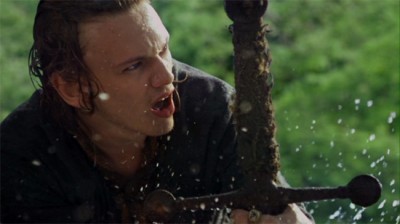 There hasn't been a shortage of gritty, sex-fueled sword-'n-combat TV series as of late, from fantasy-bound medieval tales to quasi-historical recounts, so dressing up Arthurian lore in this modern motif sounds like a logical step to take. On top of that, the British TV series Merlin (Season One and Season Two reviewed) has already taken broad steps towards deviating from the traditional legend, giving Starz -- the same folks behind Spartacus: Blood and Sand -- the chance to take liberties with the story and retain a scrap of faithfulness in comparison. In steps Camelot, a handsomely-dressed production out to reshape and embellish King Arthur's origin story, which folds in dashes of hefty influence in an attempt to balance grimy meta-realism with lustful whims and checkbox-worthy references. It's about what you'd expect, all points considering, but that becomes part of the problem when it monotonously clunks through the storytelling motions with a (mostly) miscast slate of primary characters, Eva Green notwithstanding.
There hasn't been a shortage of gritty, sex-fueled sword-'n-combat TV series as of late, from fantasy-bound medieval tales to quasi-historical recounts, so dressing up Arthurian lore in this modern motif sounds like a logical step to take. On top of that, the British TV series Merlin (Season One and Season Two reviewed) has already taken broad steps towards deviating from the traditional legend, giving Starz -- the same folks behind Spartacus: Blood and Sand -- the chance to take liberties with the story and retain a scrap of faithfulness in comparison. In steps Camelot, a handsomely-dressed production out to reshape and embellish King Arthur's origin story, which folds in dashes of hefty influence in an attempt to balance grimy meta-realism with lustful whims and checkbox-worthy references. It's about what you'd expect, all points considering, but that becomes part of the problem when it monotonously clunks through the storytelling motions with a (mostly) miscast slate of primary characters, Eva Green notwithstanding.
At its foundation, though, Camelot is a strapping, good-looking series that, from an aesthetic point of view, knows how to make the most of its budgetary boundaries with convincing low-key special effects and a novel medieval presence. In the Irish-shot locales, the stark moors and vegetation-covered buildings that populate the kingdom create a misty Celtic-inspired essence, revealing desolate beauty in its corners as it begins telling the story of King Uther Pendragon's murder. Camelot operates under the notion that nobody, aside from the powerful "retired" sorcerer Merlin (Joseph Fiennes), knows about Arthur's (Jamie Campbell Bower) claim to the throne until he's pulled from his surrogate commoner family, not even his cutthroat sister Morgan (Eva Green) -- who, with a witch's powers in tow, has a shrewd eye for obtaining Uther's crown. A power struggle ignites between the two as Arthur begins his ascension as the rightful lord of the land, with Morgan holed up in the Pendragon's stronghold and Arthur building his loyal following in the ruins of Camelot. The setting, and all the accoutrements that adorn the costume and set design within, gives it the right attitude.
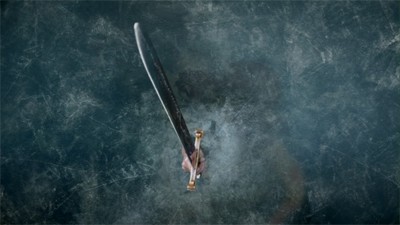 It's a familiar attitude, though. Camelot blends decently-choreographed battles, governmental posturing and plenty of sexuality, similar in all respects to Starz' own Spartacus and HBO's Rome, a distinction that's palpably intentional in its lavishness. Plenty of blood spills when the blades start clanking, and dark, devious agreements are made, some supernatural when it comes to Morgan's witchcraft and others purely political; it's a ruthless environment that requires honorable men to clean it up. The backbone's there for a lurid riff on the lore, complete with a semi-blank slate of King Arthur's younger, impressionable years, all the way down to the accessible merging of its down-to-earth historical essence with more mystical elements (which reminded me a bit of Black Death, oddly enough, in its flip-flopping between the two).
It's a familiar attitude, though. Camelot blends decently-choreographed battles, governmental posturing and plenty of sexuality, similar in all respects to Starz' own Spartacus and HBO's Rome, a distinction that's palpably intentional in its lavishness. Plenty of blood spills when the blades start clanking, and dark, devious agreements are made, some supernatural when it comes to Morgan's witchcraft and others purely political; it's a ruthless environment that requires honorable men to clean it up. The backbone's there for a lurid riff on the lore, complete with a semi-blank slate of King Arthur's younger, impressionable years, all the way down to the accessible merging of its down-to-earth historical essence with more mystical elements (which reminded me a bit of Black Death, oddly enough, in its flip-flopping between the two).
So, who should Arthur be at this stage: strapping, with a chiseled jaw and a brawny frame suggestive of his gallant future self, or somewhat flimsy and malleable as he learns the ropes of lordship and combat? The story can really go either way, but Camelot opts to go too far in the latter direction; Jamie Campbell Bower, whom you'll likely recognize as Johanna's likably valiant but mousy suitor, Anthony, in Burton's Sweeney Todd, is a bit too slight for the role of the storied king. He can elevate his voice and command a semblance of a weighty presence when needed, but his disposition -- not terribly charismatic and often discomfited -- regularly makes us wonder whether all the training under the sun could shape him into a king, even if that's part of the series' underdog-turned-ruler aims. It's a little odd, then, to see some of the other male actors around him, Arthur's knights, that could've been more intriguing in the role; even if the age didn't quite fit, it's possible that either Peter Mooney (Kay, his brother) or even the older Phillip Winchester (Guinevere's suitor, Leontes), who also made rounds on Fringe earlier this year, might have filled Arthur's boots.
Though not to the degree of Arthur, the rest of the cast feels somewhat out of place and, in spots, overextended in their theatricality -- though that's not something uncommon to Arthurian renditions, as John Boorman's Excalibur also has its share of haughty moments. Though Joseph Fiennes brings a mysterious off-kilter air to his protagonist roles, his spin on Merlin feels more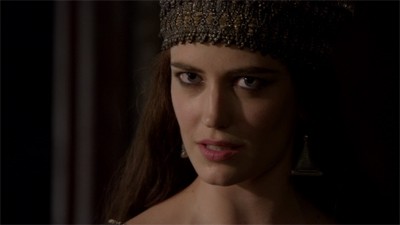 unusual than inventive, replacing a sagely temperament with stern, wrathful intensity. Others, from Claire Forlani as widowed Queen Ingraine to Tasmin Egerton as Guinevere, lose their grasp on the characters in overarching dramatic vigor, even if there's something still inherently intriguing about both. The only main character who feels truly comfortable in their role is Eva Green, who does a bang-up job as Morgan; sure, she's essentially just adding a more palpably sinister spin to her biting temperament from Casino Royale (or The Dreamers), but her deep eyes and disarming carriage breathes alluring life into Arthur's malignant half-sister.
unusual than inventive, replacing a sagely temperament with stern, wrathful intensity. Others, from Claire Forlani as widowed Queen Ingraine to Tasmin Egerton as Guinevere, lose their grasp on the characters in overarching dramatic vigor, even if there's something still inherently intriguing about both. The only main character who feels truly comfortable in their role is Eva Green, who does a bang-up job as Morgan; sure, she's essentially just adding a more palpably sinister spin to her biting temperament from Casino Royale (or The Dreamers), but her deep eyes and disarming carriage breathes alluring life into Arthur's malignant half-sister.
Camelot retraces the steps of Arthurian lore by adding unique flourishes in where some could consider "gaps", and it attempts to incorporate them in creative out-of-the-box ways that, for the most part, could work under different circumstances. Episodes explore where the Sword in the Stone fits within the more practical universe and how it would earn King Arthur a legion of followers, as well as where the legendary sword Excalibur originates from (hint: they're not one in the same this time around) and, on a base level, the history behind Camelot itself. They play up to the fabled recounts, but the show's hastiness to incorporate these elements -- the two sword episodes occur only one episode apart -- makes them feel forced, not to mention a little on the gimmicky side. What salvages these elements is the way they're handled, and how they use the lore to their advantage; the set-up in watching a crowd gawk at Arthur as he wrestles with the stone-gripped sword is both unique and familiar to the roots, while hearing the storied path, true or not, that Excalibur takes to get in the king's hands has its own momentous essence.
But other, more prominent story veins can't elude the audience's universal familiarity with mainstream Arthurian lore, the big one, which receives a hefty amount of the story's focus, being the relationship between Arthur and Guinevere. Sure enough, a love triangle -- and no, not involving Lancelot -- emerges that prevents the fabled lovers from being together right away, with marriage squabbles and respectful calls to duty as the glue holding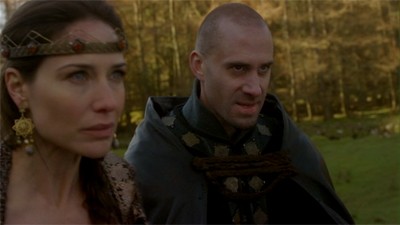 their partition together. Here's the hitch: most people know that the two will ultimately end up together, which renders their ill-fated disconnect a moot, tedious point. Where Merlin makes the most of the audience's familiarity by enhancing Arthur and Guinevere's flirtation in the midst of their class-based inability to surrender to their feelings, inching towards their predestined romance, the melodrama in Camelot feels fruitless and, really, without much point outside of seeing how the other parties involved will (potentially) splinter off from Arthur's clutches.
their partition together. Here's the hitch: most people know that the two will ultimately end up together, which renders their ill-fated disconnect a moot, tedious point. Where Merlin makes the most of the audience's familiarity by enhancing Arthur and Guinevere's flirtation in the midst of their class-based inability to surrender to their feelings, inching towards their predestined romance, the melodrama in Camelot feels fruitless and, really, without much point outside of seeing how the other parties involved will (potentially) splinter off from Arthur's clutches.
Eventually, Camelot steers away from the persistent spins on the lore and goes in its own directions, from showing Arthur's caliber of justice to the extent of Morgan's shape-shifting abilities at the tail end of the season -- though it does, in fact, wrap back around to traditional Arthurian legend. However, an array of fundamental problems hamper the series from really catching fire, weighed down by its trappings and frequently overexerting itself, and it ends on an unsettling, irresolute cliffhanger that's somewhat familiar to those with some knowledge of the story. That's where the problem lies, though some might be quick to attribute the series' cancellation to the popularity of Game of Thrones or Starz' other violent, sex-driven series: the promise at-hand is fumbled, and that -- along with a middling viewership -- is why Camelot, a not-so-bad series with some crippling flaws, was abruptly chopped and tossed atop the ever-mounting graveyard of one-season flops. It could've been a hell of a lot better.
Note: Relevant content applicable to both Blu-ray and DVD releases of Camelot has been shared across reviews of both presentations. Read DVDTalk's Blu-ray review here.
The DVD:
Say what you will about the episodes contained within, but this DVD presentation from Anchor Bay (which mirrors the Blu-ray beat-for-beat, sitting taller and sans the blue strip on the top) is gorgeous. Spread across three discs that all carry the Pendragon insignia in separate colors, Camelot arrives in a slickly-designed foldout digipack, with a sturdy and shimmering outer cardboard box encasing the package. The inserts casually float around without a flap to rest in, but they're nothing of consequence anyway: ads for games and other Starz products.
Video and Audio:
If you're still planning on checking out Camelot, I'd recommend doing so on Blu-ray if you have the availability. For one, those discs offer a really cool Camelot Pop-Up History textual commentary/trivia feature that's genuinely insightful. And secondly, the reason it bears mention in the audiovisual portion of this review, is that the transfer quality on the DVDs isn't as strong as it could be for this medium. Mostly, the episodes look suitable to very good; exterior shots in the Ireland shooting locale capture the lush greens and grimy, deep browns, bringing out even more detail as the sunlight starts pouring into the image, although a few scenes do gradate a bit oddly when the sun's too bright. Interior shots, however, as well as any shots involving deep shadows, reveal the creaks in the foundation. The contrast -- inky as it may be -- has a tendency of swallowing up detail visible in high-definition, ranging from mild crush to a few really deep instances. Sure, these scenes are counterbalanced by the vibrant successes in the transfers, from the crisp blue CG ice in one episode, the billowing fire in another, and the general range of motion during combat scenes. But it's got a few issues that weigh it down.
In a bit of a surprise, the Dolby Digital 5.1 tracks actually counterbalance the questions over the visuals with deft, spatially-sprawled surround offerings, impressing to a degree that it almost matches beat-for-beat with the TrueHD tracks on the Blu-ray. Activity routinely stretches its legs to the rear extremities of the sound stage, from the chatter of crowds to the echoes of a large hall and splashing of water, while the clanking of blades and other higher-pitched medieval warfare effects dish out plenty of punch from the front-end of the arrangements. The music, one of the series' strong suits, dips into the lower-frequency channel regularly, staying balanced but sweeping, while the flickering of an enraged campfire and other throatier audio elements reach down to the depth with an admirable amount of resonance. English and Spanish subtitles accompany the English-language track.
Special Features:
A range of Featurettes compliment the rest of Camelot's package, but the slate of content available here veers is greater in number than it is in substance. Starz Studios: Camelot (14:32, 16x9) offers the most in terms of in-depth insight into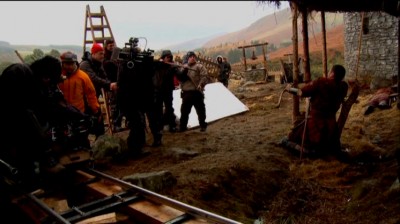 the actual series, plopping the actors and cast/crew in the interview chairs for a fifteen-minute stretch that's one or two steps above a press-kit compilation. It reveals bits about the tone of the series, the Irish shooting location and the unpredictable weather, and other points. Two other very brief features, The Knights (2:12, 16x9) and The Women of Camelot (2:47, 16x9), quickly take a glimpse at the chivalry of the men and the daring strength of the women, while Character Profiles takes more concentrated looks at each of the primary and secondary characters. Rounding out the rest of the substantive extras are the Scene Breakdowns -- The Lady in the Lake (2:47, 16x9), Fire at Castle Pendragon (1:22, 16x9), and The Sword in the Stone (2:55, 16x9) -- that summarizes specific moments in the series, briefly show how they were achieved, and reveal some of the creativity that went into reimagining them for this new take on Arthur.
the actual series, plopping the actors and cast/crew in the interview chairs for a fifteen-minute stretch that's one or two steps above a press-kit compilation. It reveals bits about the tone of the series, the Irish shooting location and the unpredictable weather, and other points. Two other very brief features, The Knights (2:12, 16x9) and The Women of Camelot (2:47, 16x9), quickly take a glimpse at the chivalry of the men and the daring strength of the women, while Character Profiles takes more concentrated looks at each of the primary and secondary characters. Rounding out the rest of the substantive extras are the Scene Breakdowns -- The Lady in the Lake (2:47, 16x9), Fire at Castle Pendragon (1:22, 16x9), and The Sword in the Stone (2:55, 16x9) -- that summarizes specific moments in the series, briefly show how they were achieved, and reveal some of the creativity that went into reimagining them for this new take on Arthur.
The rest of the features are more lighthearted and fun for fans. Candid Camelot (1:18, 16x9) briefly tosses together behind-the-scenes shenanigans, though it shouldn't be confused with a slightly different Blooper Reel (5:29, 16x9) that features actual fumbled footage during shooting. And finally, On the Set: Mooney's Movie (2:53, 16x9) does more of the same with behind-the-scenes "diaries" from Peter Mooney and Jamie Campbell Bower, which shows a bit of the chemistry between the two actors.
Final Thoughts:
Camelot isn't a terrible sword-'n-sorcery spin on the Arthur legend, a stern-faced version that you actually really want to like, but its foundation-weakening missteps and a merely suitable rush of excitement and drama weaken the actual impressions it leaves. The look and the respectful lore-inspired framework are both there, tossing itself in the genre's fray with the now-expected mix of violence, sex, politics and gallantry, yet it's consistently haunted by questionable casting choices and a meandering direction, not to mention trying to coexist with another TV series, Game of Thrones, that manages to do a lot of the same things with a clearer, more interesting perspective. When it's boiled down to the essentials, it's a series that could've easily been tightened with a little extra time; however, in the current climate, Camelot saw an abrupt demise that leaves the series -- and this Complete First Season set from Anchor Bay -- dangling without a satisfying resolution. Fans of fantasy series and Arthurian lore will find something worth checking out by giving this a Rental, though I'd probably recommend watching a combo of Excalibur and Spartacus instead.
Thomas Spurlin, Staff Reviewer -- DVDTalk Reviews | Personal Blog/Site
 There hasn't been a shortage of gritty, sex-fueled sword-'n-combat TV series as of late, from fantasy-bound medieval tales to quasi-historical recounts, so dressing up Arthurian lore in this modern motif sounds like a logical step to take. On top of that, the British TV series Merlin (Season One and Season Two reviewed) has already taken broad steps towards deviating from the traditional legend, giving Starz -- the same folks behind Spartacus: Blood and Sand -- the chance to take liberties with the story and retain a scrap of faithfulness in comparison. In steps Camelot, a handsomely-dressed production out to reshape and embellish King Arthur's origin story, which folds in dashes of hefty influence in an attempt to balance grimy meta-realism with lustful whims and checkbox-worthy references. It's about what you'd expect, all points considering, but that becomes part of the problem when it monotonously clunks through the storytelling motions with a (mostly) miscast slate of primary characters, Eva Green notwithstanding.
There hasn't been a shortage of gritty, sex-fueled sword-'n-combat TV series as of late, from fantasy-bound medieval tales to quasi-historical recounts, so dressing up Arthurian lore in this modern motif sounds like a logical step to take. On top of that, the British TV series Merlin (Season One and Season Two reviewed) has already taken broad steps towards deviating from the traditional legend, giving Starz -- the same folks behind Spartacus: Blood and Sand -- the chance to take liberties with the story and retain a scrap of faithfulness in comparison. In steps Camelot, a handsomely-dressed production out to reshape and embellish King Arthur's origin story, which folds in dashes of hefty influence in an attempt to balance grimy meta-realism with lustful whims and checkbox-worthy references. It's about what you'd expect, all points considering, but that becomes part of the problem when it monotonously clunks through the storytelling motions with a (mostly) miscast slate of primary characters, Eva Green notwithstanding. At its foundation, though, Camelot is a strapping, good-looking series that, from an aesthetic point of view, knows how to make the most of its budgetary boundaries with convincing low-key special effects and a novel medieval presence. In the Irish-shot locales, the stark moors and vegetation-covered buildings that populate the kingdom create a misty Celtic-inspired essence, revealing desolate beauty in its corners as it begins telling the story of King Uther Pendragon's murder. Camelot operates under the notion that nobody, aside from the powerful "retired" sorcerer Merlin (Joseph Fiennes), knows about Arthur's (Jamie Campbell Bower) claim to the throne until he's pulled from his surrogate commoner family, not even his cutthroat sister Morgan (Eva Green) -- who, with a witch's powers in tow, has a shrewd eye for obtaining Uther's crown. A power struggle ignites between the two as Arthur begins his ascension as the rightful lord of the land, with Morgan holed up in the Pendragon's stronghold and Arthur building his loyal following in the ruins of Camelot. The setting, and all the accoutrements that adorn the costume and set design within, gives it the right attitude.
 It's a familiar attitude, though. Camelot blends decently-choreographed battles, governmental posturing and plenty of sexuality, similar in all respects to Starz' own Spartacus and HBO's Rome, a distinction that's palpably intentional in its lavishness. Plenty of blood spills when the blades start clanking, and dark, devious agreements are made, some supernatural when it comes to Morgan's witchcraft and others purely political; it's a ruthless environment that requires honorable men to clean it up. The backbone's there for a lurid riff on the lore, complete with a semi-blank slate of King Arthur's younger, impressionable years, all the way down to the accessible merging of its down-to-earth historical essence with more mystical elements (which reminded me a bit of Black Death, oddly enough, in its flip-flopping between the two).
It's a familiar attitude, though. Camelot blends decently-choreographed battles, governmental posturing and plenty of sexuality, similar in all respects to Starz' own Spartacus and HBO's Rome, a distinction that's palpably intentional in its lavishness. Plenty of blood spills when the blades start clanking, and dark, devious agreements are made, some supernatural when it comes to Morgan's witchcraft and others purely political; it's a ruthless environment that requires honorable men to clean it up. The backbone's there for a lurid riff on the lore, complete with a semi-blank slate of King Arthur's younger, impressionable years, all the way down to the accessible merging of its down-to-earth historical essence with more mystical elements (which reminded me a bit of Black Death, oddly enough, in its flip-flopping between the two). So, who should Arthur be at this stage: strapping, with a chiseled jaw and a brawny frame suggestive of his gallant future self, or somewhat flimsy and malleable as he learns the ropes of lordship and combat? The story can really go either way, but Camelot opts to go too far in the latter direction; Jamie Campbell Bower, whom you'll likely recognize as Johanna's likably valiant but mousy suitor, Anthony, in Burton's Sweeney Todd, is a bit too slight for the role of the storied king. He can elevate his voice and command a semblance of a weighty presence when needed, but his disposition -- not terribly charismatic and often discomfited -- regularly makes us wonder whether all the training under the sun could shape him into a king, even if that's part of the series' underdog-turned-ruler aims. It's a little odd, then, to see some of the other male actors around him, Arthur's knights, that could've been more intriguing in the role; even if the age didn't quite fit, it's possible that either Peter Mooney (Kay, his brother) or even the older Phillip Winchester (Guinevere's suitor, Leontes), who also made rounds on Fringe earlier this year, might have filled Arthur's boots.
Though not to the degree of Arthur, the rest of the cast feels somewhat out of place and, in spots, overextended in their theatricality -- though that's not something uncommon to Arthurian renditions, as John Boorman's Excalibur also has its share of haughty moments. Though Joseph Fiennes brings a mysterious off-kilter air to his protagonist roles, his spin on Merlin feels more
 unusual than inventive, replacing a sagely temperament with stern, wrathful intensity. Others, from Claire Forlani as widowed Queen Ingraine to Tasmin Egerton as Guinevere, lose their grasp on the characters in overarching dramatic vigor, even if there's something still inherently intriguing about both. The only main character who feels truly comfortable in their role is Eva Green, who does a bang-up job as Morgan; sure, she's essentially just adding a more palpably sinister spin to her biting temperament from Casino Royale (or The Dreamers), but her deep eyes and disarming carriage breathes alluring life into Arthur's malignant half-sister.
unusual than inventive, replacing a sagely temperament with stern, wrathful intensity. Others, from Claire Forlani as widowed Queen Ingraine to Tasmin Egerton as Guinevere, lose their grasp on the characters in overarching dramatic vigor, even if there's something still inherently intriguing about both. The only main character who feels truly comfortable in their role is Eva Green, who does a bang-up job as Morgan; sure, she's essentially just adding a more palpably sinister spin to her biting temperament from Casino Royale (or The Dreamers), but her deep eyes and disarming carriage breathes alluring life into Arthur's malignant half-sister. Camelot retraces the steps of Arthurian lore by adding unique flourishes in where some could consider "gaps", and it attempts to incorporate them in creative out-of-the-box ways that, for the most part, could work under different circumstances. Episodes explore where the Sword in the Stone fits within the more practical universe and how it would earn King Arthur a legion of followers, as well as where the legendary sword Excalibur originates from (hint: they're not one in the same this time around) and, on a base level, the history behind Camelot itself. They play up to the fabled recounts, but the show's hastiness to incorporate these elements -- the two sword episodes occur only one episode apart -- makes them feel forced, not to mention a little on the gimmicky side. What salvages these elements is the way they're handled, and how they use the lore to their advantage; the set-up in watching a crowd gawk at Arthur as he wrestles with the stone-gripped sword is both unique and familiar to the roots, while hearing the storied path, true or not, that Excalibur takes to get in the king's hands has its own momentous essence.
But other, more prominent story veins can't elude the audience's universal familiarity with mainstream Arthurian lore, the big one, which receives a hefty amount of the story's focus, being the relationship between Arthur and Guinevere. Sure enough, a love triangle -- and no, not involving Lancelot -- emerges that prevents the fabled lovers from being together right away, with marriage squabbles and respectful calls to duty as the glue holding
 their partition together. Here's the hitch: most people know that the two will ultimately end up together, which renders their ill-fated disconnect a moot, tedious point. Where Merlin makes the most of the audience's familiarity by enhancing Arthur and Guinevere's flirtation in the midst of their class-based inability to surrender to their feelings, inching towards their predestined romance, the melodrama in Camelot feels fruitless and, really, without much point outside of seeing how the other parties involved will (potentially) splinter off from Arthur's clutches.
their partition together. Here's the hitch: most people know that the two will ultimately end up together, which renders their ill-fated disconnect a moot, tedious point. Where Merlin makes the most of the audience's familiarity by enhancing Arthur and Guinevere's flirtation in the midst of their class-based inability to surrender to their feelings, inching towards their predestined romance, the melodrama in Camelot feels fruitless and, really, without much point outside of seeing how the other parties involved will (potentially) splinter off from Arthur's clutches. Eventually, Camelot steers away from the persistent spins on the lore and goes in its own directions, from showing Arthur's caliber of justice to the extent of Morgan's shape-shifting abilities at the tail end of the season -- though it does, in fact, wrap back around to traditional Arthurian legend. However, an array of fundamental problems hamper the series from really catching fire, weighed down by its trappings and frequently overexerting itself, and it ends on an unsettling, irresolute cliffhanger that's somewhat familiar to those with some knowledge of the story. That's where the problem lies, though some might be quick to attribute the series' cancellation to the popularity of Game of Thrones or Starz' other violent, sex-driven series: the promise at-hand is fumbled, and that -- along with a middling viewership -- is why Camelot, a not-so-bad series with some crippling flaws, was abruptly chopped and tossed atop the ever-mounting graveyard of one-season flops. It could've been a hell of a lot better.
Note: Relevant content applicable to both Blu-ray and DVD releases of Camelot has been shared across reviews of both presentations. Read DVDTalk's Blu-ray review here.
The DVD:
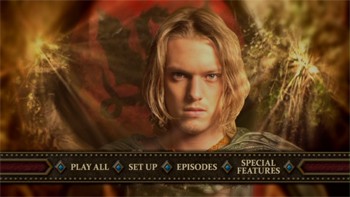 | 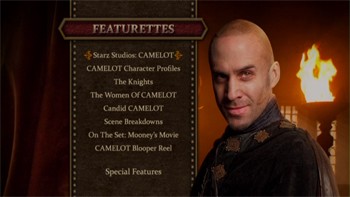 |
Say what you will about the episodes contained within, but this DVD presentation from Anchor Bay (which mirrors the Blu-ray beat-for-beat, sitting taller and sans the blue strip on the top) is gorgeous. Spread across three discs that all carry the Pendragon insignia in separate colors, Camelot arrives in a slickly-designed foldout digipack, with a sturdy and shimmering outer cardboard box encasing the package. The inserts casually float around without a flap to rest in, but they're nothing of consequence anyway: ads for games and other Starz products.
Video and Audio:
If you're still planning on checking out Camelot, I'd recommend doing so on Blu-ray if you have the availability. For one, those discs offer a really cool Camelot Pop-Up History textual commentary/trivia feature that's genuinely insightful. And secondly, the reason it bears mention in the audiovisual portion of this review, is that the transfer quality on the DVDs isn't as strong as it could be for this medium. Mostly, the episodes look suitable to very good; exterior shots in the Ireland shooting locale capture the lush greens and grimy, deep browns, bringing out even more detail as the sunlight starts pouring into the image, although a few scenes do gradate a bit oddly when the sun's too bright. Interior shots, however, as well as any shots involving deep shadows, reveal the creaks in the foundation. The contrast -- inky as it may be -- has a tendency of swallowing up detail visible in high-definition, ranging from mild crush to a few really deep instances. Sure, these scenes are counterbalanced by the vibrant successes in the transfers, from the crisp blue CG ice in one episode, the billowing fire in another, and the general range of motion during combat scenes. But it's got a few issues that weigh it down.
In a bit of a surprise, the Dolby Digital 5.1 tracks actually counterbalance the questions over the visuals with deft, spatially-sprawled surround offerings, impressing to a degree that it almost matches beat-for-beat with the TrueHD tracks on the Blu-ray. Activity routinely stretches its legs to the rear extremities of the sound stage, from the chatter of crowds to the echoes of a large hall and splashing of water, while the clanking of blades and other higher-pitched medieval warfare effects dish out plenty of punch from the front-end of the arrangements. The music, one of the series' strong suits, dips into the lower-frequency channel regularly, staying balanced but sweeping, while the flickering of an enraged campfire and other throatier audio elements reach down to the depth with an admirable amount of resonance. English and Spanish subtitles accompany the English-language track.
Special Features:
A range of Featurettes compliment the rest of Camelot's package, but the slate of content available here veers is greater in number than it is in substance. Starz Studios: Camelot (14:32, 16x9) offers the most in terms of in-depth insight into
 the actual series, plopping the actors and cast/crew in the interview chairs for a fifteen-minute stretch that's one or two steps above a press-kit compilation. It reveals bits about the tone of the series, the Irish shooting location and the unpredictable weather, and other points. Two other very brief features, The Knights (2:12, 16x9) and The Women of Camelot (2:47, 16x9), quickly take a glimpse at the chivalry of the men and the daring strength of the women, while Character Profiles takes more concentrated looks at each of the primary and secondary characters. Rounding out the rest of the substantive extras are the Scene Breakdowns -- The Lady in the Lake (2:47, 16x9), Fire at Castle Pendragon (1:22, 16x9), and The Sword in the Stone (2:55, 16x9) -- that summarizes specific moments in the series, briefly show how they were achieved, and reveal some of the creativity that went into reimagining them for this new take on Arthur.
the actual series, plopping the actors and cast/crew in the interview chairs for a fifteen-minute stretch that's one or two steps above a press-kit compilation. It reveals bits about the tone of the series, the Irish shooting location and the unpredictable weather, and other points. Two other very brief features, The Knights (2:12, 16x9) and The Women of Camelot (2:47, 16x9), quickly take a glimpse at the chivalry of the men and the daring strength of the women, while Character Profiles takes more concentrated looks at each of the primary and secondary characters. Rounding out the rest of the substantive extras are the Scene Breakdowns -- The Lady in the Lake (2:47, 16x9), Fire at Castle Pendragon (1:22, 16x9), and The Sword in the Stone (2:55, 16x9) -- that summarizes specific moments in the series, briefly show how they were achieved, and reveal some of the creativity that went into reimagining them for this new take on Arthur. The rest of the features are more lighthearted and fun for fans. Candid Camelot (1:18, 16x9) briefly tosses together behind-the-scenes shenanigans, though it shouldn't be confused with a slightly different Blooper Reel (5:29, 16x9) that features actual fumbled footage during shooting. And finally, On the Set: Mooney's Movie (2:53, 16x9) does more of the same with behind-the-scenes "diaries" from Peter Mooney and Jamie Campbell Bower, which shows a bit of the chemistry between the two actors.
Final Thoughts:
Camelot isn't a terrible sword-'n-sorcery spin on the Arthur legend, a stern-faced version that you actually really want to like, but its foundation-weakening missteps and a merely suitable rush of excitement and drama weaken the actual impressions it leaves. The look and the respectful lore-inspired framework are both there, tossing itself in the genre's fray with the now-expected mix of violence, sex, politics and gallantry, yet it's consistently haunted by questionable casting choices and a meandering direction, not to mention trying to coexist with another TV series, Game of Thrones, that manages to do a lot of the same things with a clearer, more interesting perspective. When it's boiled down to the essentials, it's a series that could've easily been tightened with a little extra time; however, in the current climate, Camelot saw an abrupt demise that leaves the series -- and this Complete First Season set from Anchor Bay -- dangling without a satisfying resolution. Fans of fantasy series and Arthurian lore will find something worth checking out by giving this a Rental, though I'd probably recommend watching a combo of Excalibur and Spartacus instead.
|
| Popular Reviews |
| Sponsored Links |
|
|
| Sponsored Links |
|
|
| Release List | Reviews | Shop | Newsletter | Forum | DVD Giveaways | Blu-Ray | Advertise |
|
Copyright 2024 DVDTalk.com All Rights Reserved. Legal Info, Privacy Policy, Terms of Use,
Manage Preferences,
Your Privacy Choices | |||||||















